Intro
Discover Rectal Fissure Symptoms, including anal pain, bleeding, and spasms. Learn about causes, treatment, and management of this painful condition, also known as anal fissures, and find relief from symptoms like rectal tearing and discomfort.
Rectal fissures are a common and often painful condition that affects millions of people worldwide. A rectal fissure is a small tear in the lining of the anus, which can cause significant discomfort and disrupt daily life. Understanding the symptoms of rectal fissures is crucial for seeking proper medical attention and receiving effective treatment. In this article, we will delve into the world of rectal fissures, exploring their symptoms, causes, and treatment options.
Rectal fissures can be caused by a variety of factors, including constipation, diarrhea, and childbirth. When the anal sphincter is stretched or torn, it can lead to the formation of a fissure. This can be a painful and debilitating condition, making everyday activities such as bowel movements, sitting, and walking a challenge. The symptoms of rectal fissures can vary in severity, but they often include pain, bleeding, and itching around the anus.
The importance of recognizing the symptoms of rectal fissures cannot be overstated. If left untreated, rectal fissures can lead to more serious complications, such as infection, abscesses, and fistulas. Furthermore, rectal fissures can have a significant impact on a person's quality of life, causing emotional distress, anxiety, and depression. By understanding the symptoms of rectal fissures, individuals can seek medical attention early, reducing the risk of complications and promoting effective treatment.
Causes and Risk Factors of Rectal Fissures
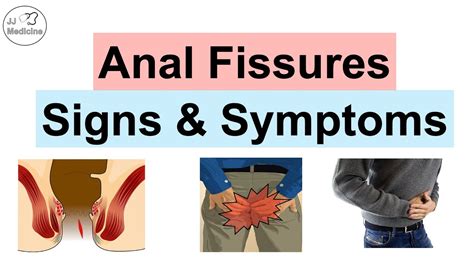
Rectal fissures are often caused by a combination of factors, including constipation, diarrhea, and childbirth. Constipation can cause the anal sphincter to stretch, leading to the formation of a fissure. Diarrhea can also contribute to the development of rectal fissures, as the frequent passage of stool can irritate the anal lining. Childbirth is another common cause of rectal fissures, as the anal sphincter can be stretched or torn during delivery. Other risk factors for rectal fissures include aging, poor diet, and certain medical conditions, such as inflammatory bowel disease.
Common Causes of Rectal Fissures
The following are some common causes of rectal fissures: * Constipation * Diarrhea * Childbirth * Aging * Poor diet * Inflammatory bowel disease * Anal sex * Trauma to the anusSymptoms of Rectal Fissures
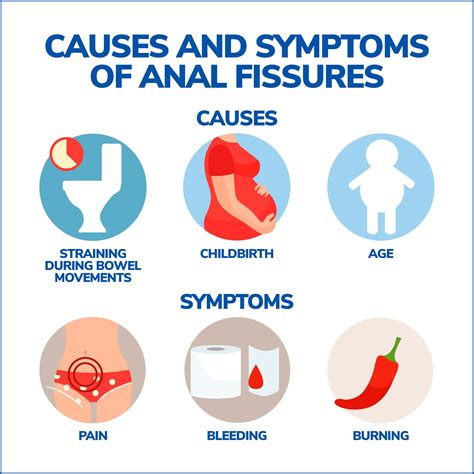
The symptoms of rectal fissures can vary in severity, but they often include pain, bleeding, and itching around the anus. The pain associated with rectal fissures can be severe, making everyday activities such as bowel movements, sitting, and walking a challenge. Bleeding is another common symptom of rectal fissures, as the fissure can cause the anal lining to bleed. Itching and discomfort around the anus are also common symptoms, as the fissure can cause irritation and inflammation.
Common Symptoms of Rectal Fissures
The following are some common symptoms of rectal fissures: * Pain during bowel movements * Bleeding during bowel movements * Itching and discomfort around the anus * Pain when sitting or walking * Difficulty passing stool * Feeling of incomplete evacuationDiagnosis and Treatment of Rectal Fissures
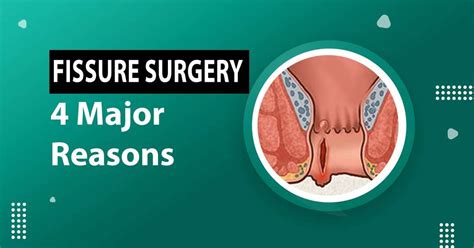
Diagnosing rectal fissures typically involves a physical examination and medical history. A healthcare provider may perform a digital rectal examination to feel for any abnormalities in the anal lining. In some cases, a sigmoidoscopy or colonoscopy may be performed to rule out other conditions, such as inflammatory bowel disease. Treatment for rectal fissures often involves a combination of lifestyle changes, medical treatments, and surgery.
Treatment Options for Rectal Fissures
The following are some treatment options for rectal fissures: * Lifestyle changes, such as increasing fiber intake and staying hydrated * Medical treatments, such as pain relievers and stool softeners * Topical creams and ointments, such as nitroglycerin and diltiazem * Surgery, such as fissurectomy or anal dilationPrevention of Rectal Fissures
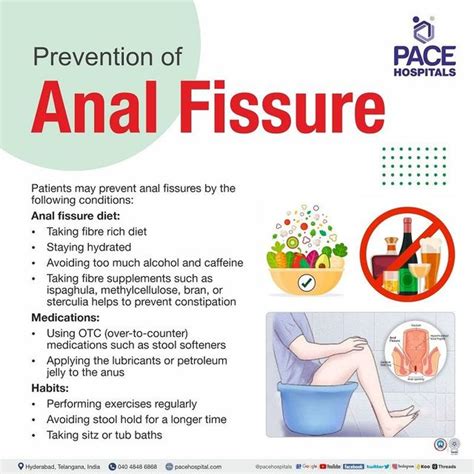
Preventing rectal fissures involves making lifestyle changes to reduce the risk of developing the condition. Increasing fiber intake and staying hydrated can help prevent constipation, which is a common cause of rectal fissures. Avoiding straining during bowel movements and taking regular breaks to stretch and move around can also help reduce the risk of rectal fissures. Maintaining good anal hygiene and avoiding irritants, such as harsh soaps and fragrances, can also help prevent rectal fissures.
Prevention Strategies for Rectal Fissures
The following are some prevention strategies for rectal fissures: * Increase fiber intake * Stay hydrated * Avoid straining during bowel movements * Take regular breaks to stretch and move around * Maintain good anal hygiene * Avoid irritants, such as harsh soaps and fragrancesComplications of Rectal Fissures
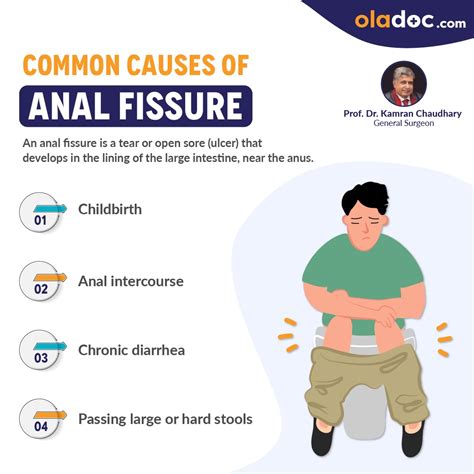
If left untreated, rectal fissures can lead to more serious complications, such as infection, abscesses, and fistulas. Infection can occur when bacteria enter the fissure, causing symptoms such as fever, chills, and increased pain. Abscesses can form when pus accumulates in the fissure, causing symptoms such as swelling, redness, and increased pain. Fistulas can occur when the fissure extends into the surrounding tissue, causing symptoms such as discharge, bleeding, and pain.
Common Complications of Rectal Fissures
The following are some common complications of rectal fissures: * Infection * Abscesses * Fistulas * Anal stenosis * Chronic painLiving with Rectal Fissures
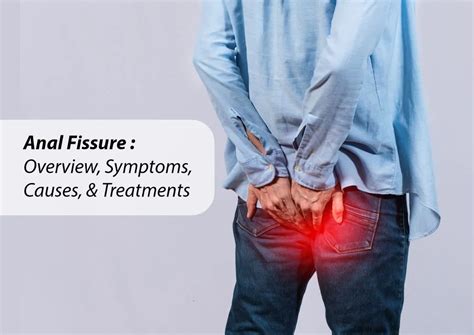
Living with rectal fissures can be challenging, but there are ways to manage the condition and reduce symptoms. Making lifestyle changes, such as increasing fiber intake and staying hydrated, can help prevent constipation and reduce the risk of complications. Using topical creams and ointments, such as nitroglycerin and diltiazem, can help reduce pain and promote healing. Seeking support from healthcare providers, family, and friends can also help individuals cope with the emotional and psychological impact of rectal fissures.
Coping Strategies for Rectal Fissures
The following are some coping strategies for rectal fissures: * Make lifestyle changes, such as increasing fiber intake and staying hydrated * Use topical creams and ointments, such as nitroglycerin and diltiazem * Seek support from healthcare providers, family, and friends * Practice relaxation techniques, such as deep breathing and meditation * Join a support group to connect with others who have rectal fissuresConclusion and Final Thoughts

In conclusion, rectal fissures are a common and often painful condition that affects millions of people worldwide. Understanding the symptoms, causes, and treatment options for rectal fissures is crucial for seeking proper medical attention and receiving effective treatment. By making lifestyle changes, using medical treatments, and seeking support from healthcare providers, individuals can manage their symptoms and reduce the risk of complications. Remember, rectal fissures are a treatable condition, and with the right approach, individuals can find relief and improve their quality of life.
We invite you to share your thoughts and experiences with rectal fissures in the comments section below. Have you or someone you know been affected by rectal fissures? What strategies have you found helpful in managing symptoms and reducing the risk of complications? By sharing your story, you can help others who are struggling with rectal fissures and promote awareness and understanding of this common condition.
What are the symptoms of rectal fissures?
+The symptoms of rectal fissures include pain, bleeding, and itching around the anus. The pain can be severe, making everyday activities such as bowel movements, sitting, and walking a challenge.
What are the causes of rectal fissures?
+Rectal fissures are often caused by a combination of factors, including constipation, diarrhea, and childbirth. Constipation can cause the anal sphincter to stretch, leading to the formation of a fissure.
How are rectal fissures diagnosed?
+Diagnosing rectal fissures typically involves a physical examination and medical history. A healthcare provider may perform a digital rectal examination to feel for any abnormalities in the anal lining.
What are the treatment options for rectal fissures?
+Treatment for rectal fissures often involves a combination of lifestyle changes, medical treatments, and surgery. Lifestyle changes, such as increasing fiber intake and staying hydrated, can help prevent constipation and reduce the risk of complications.
Can rectal fissures be prevented?
+Yes, rectal fissures can be prevented by making lifestyle changes, such as increasing fiber intake and staying hydrated. Avoiding straining during bowel movements and taking regular breaks to stretch and move around can also help reduce the risk of rectal fissures.
